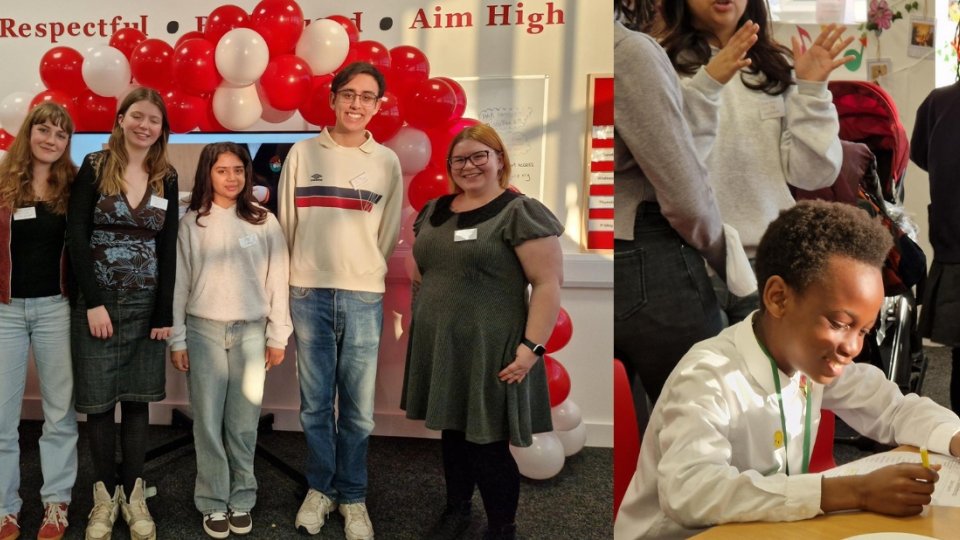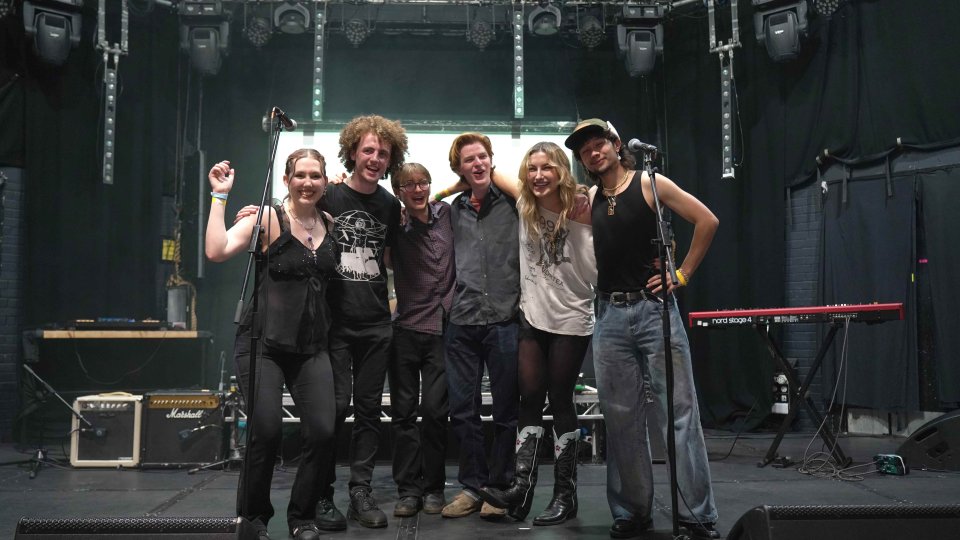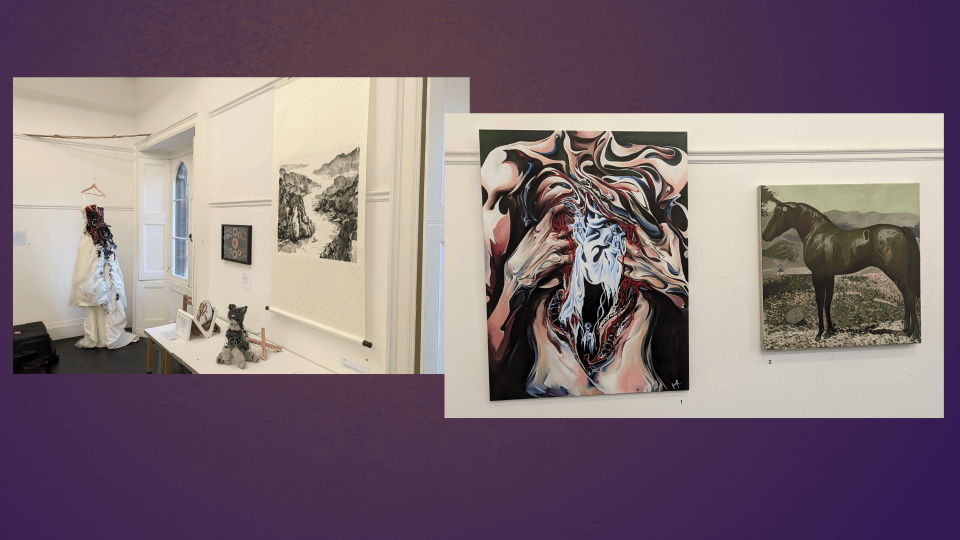
Alice is from Skipton in North Yorkshire and has just finished her third year here at King's College, Cambridge, studying Music. Alice did her GCSE's in Skipton then studied at a Music School in Edinburgh for a combination of A levels and Scottish Advanced Highers in Music, Mathematics, Further Mathematics, French and German.
Why did you choose to study Music at Cambridge?
I’ve played musical instruments ever since I was quite little, and famously told my Year 2 teacher that I wanted to be a classical musician when I grew up (she asked me if I meant popstar and I was like ‘no, like my violin teacher!’). However, my parents were understandably not too keen on the job instability that comes with being a professional musician, and so were trying to persuade me to get a degree at university. In truth, a music degree is very different to how I thought it would be, but I’m so glad I decided to go to university rather than train at a music college!
How does the teaching work?
For music, most of the teaching is split into lectures, where a professor gets up at the front of the room and kind of talks at you for an hour and a half(!), and supervisions, which are meetings between an academic and 1-4 students in a much smaller class-like setting. Music is quite unique in Cambridge in that you have a lot of one-to-one supervisions in first year, for things like harmony, counterpoint and keyboard skill. Luckily these aren’t too scary – it’s very useful to be able to go at your own pace (lots of people come to Cambridge with no prior experience of any of those things) and the keyboard skills supervisions are a bit like glorified piano lessons!
How do you find supervisions?
With the exception of keyboard skills, most supervisions are reasonably similar: you get sent an assignment about a week or so before, which could be an essay or a harmony exercise, and you then give your work to the academic in advance of a supervision. If it’s a one-to-one supervision they might talk about your essay with you, or they might get you to talk about more general aspects of the course before handing your comments back. Sometimes the first supervisions can feel quite scary if the supervisor is a bit intimidating, but it helped me to remember that I’m supposed to have forgotten things from lectures and ask ‘silly’ questions – that’s what supervisions are for!
How is studying at Cambridge different to your experience of studying at school?
In my first year I didn’t find it that dissimilar, but as time has gone on I’ve noticed that I have to think more about how to motivate myself, and how to manage my time – in my third year I quite often had absolutely nothing scheduled on Wednesday to Friday and it is tempting to just stay in bed all day watching Netflix.
What is your workload like? Is there time to do other things?
You can certainly keep other stuff up. Music students are almost infamous for their ability to run an opera, conduct an orchestra and sing in their college choir three times a week all whilst (supposedly) keeping up with their work!
I’ve sung in the mixed college choir, King’s Voices, for all three years [Alice was a Choral Exhibitioner]. In my first two years I played oboe in the university symphony orchestra. However, I’ve been ill quite a lot in third year, so I decided to not do any orchestral playing so that I could look after myself properly. Sometimes it’s just nice to have the free time to cook dinner with your friends instead of rushing off to a three-hour orchestra rehearsal.
What do you like to do when you're not working?
Predictably, I do play a lot of music. Being at Cambridge has allowed me to be part of some really cool projects, like playing in the university opera society’s production of Tchaikovsky’s Eugene Onegin (I got to be in a pit, which was quite exciting!). I’ve also been lucky enough to have an oven and hobs so once or twice a term we’d get a big group together and cook up a nice meal.
What is the social life like in College?
The social life in college is really great – there’s definitely a sense of community and it’s nice to know that if I’ve been cooped up in my room all day I can go down to the coffee shop and see a few friendly faces.
The college system is nice in that you get to know a small subsection of people who are outside the music faculty, and do a wide variety subjects – not that we talk about work all the time, but it is interesting to discuss things with an English student, or a Social Anthropologist.
Where in College do you live this year?
I lived in S staircase this year, which is within the central college grounds, slightly set back from the river. As it was my final year, I did want to live in college, but I can’t really afford the rooms right on the river (!). As a music student, you do have quite a limited choice, because you have to have a piano. Unfortunately, you move to the pianos, rather than the pianos moving to you, so for both second and third years I chose from a list of around 15 rooms. Luckily, I have managed to have a proper kitchen in all three years, which was my biggest priority!
What about practical issues?
The faculty is really close (10 minutes’ walk, 5 minutes if you’re late…), so I didn’t get a bike until second year. I found libraries quite nice to work in, especially the music faculty library, because it’s small enough that it’s actually quite sociable. Plus, they put out free chocolate in exam term!
However, if I really needed to concentrate on something, for example when I was redrafting coursework, I found it easier to be in my room. I had a really nice desk and a window that looks out onto the Provost’s garden, so not too shabby!
What are the best and worst things about studying Music?
The best thing is that you can tailor your degree to suit your own personal interests, and as long as it is still vaguely orientated around ‘music’ (or the use of music!) it counts. For example, my dissertation this year was all about Martha Graham, the contemporary dance icon, and her choreography to Stravinsky’s Rite of Spring – so taking a fairly old subject that has hundreds of books written about it and giving it a new perspective.
The worst thing is that sometimes they expect you to have read those hundreds of books, or at least magically know which ones might be useful and relevant to the essay subject… I have gotten very good at skim-reading contents pages and getting a general idea for what a book is about.
Are there any things that you struggled with initially?
I didn’t take very many essay subjects at A2, apart from languages and music (I think we had one 20-mark ‘essay’ or something), so when I first arrived my essay skills weren’t particularly great. My initial response to this was to shy away from coursework-based modules, but doing these modules is almost the only way you’ll get one-to-one advice on your writing style. It’s counter-intuitive to say that you should do a dissertation to improve your writing, but if you have lots of ideas and aren’t very good at articulating them (definitely me) it can actually be a really rewarding experience! Also just don’t be afraid to ask for help – initially, I was so scared of letting a supervisor know that I was struggling with the work that I never gave them a chance to actually help me.
Another thing I found difficult was starting at King's. I wasn’t too nervous about living away from home, but I was very anxious about making ‘friends’ and fitting in. I found it quite hard to relate to some of the other music students, because although they were all very nice people, they spent a lot of time together in the other College choir which kind of separated me from them. Fortunately, there are lots of other people around though, and I did meet a lot of good friends through the university orchestras, and College (both music students and otherwise) who I get on with well!
What do you normally do during the vacations?
Sleep. A lot. I joke, but in all honesty I think I have gotten sick at the start of nearly every vacation at Cambridge – I think my body knows it has to get to the end of term and then as soon as I relax it gives up!
I’m pretty lucky in that I got a bursary [through what’s now called the Cambridge Bursary Scheme], which was enough to make me financially independent from my mum and also ensure I didn't have to work during the holidays. This means I got to do lots of fun stuff, like going on choir and orchestra tours in Europe, which are always fun and a great bonding experience! Last summer, I was also chosen to go on an exchange to Heidelberg University, where I stayed for a month and did a German language course, all paid for by the college!
If you do want to work during the summer, there are some quite good opportunities within Cambridge itself. This summer I wanted to save up a bit of money, so I’m working on one of the summer courses within Cambridge, which is quite well paid.
How did you find the application process?
I didn’t find filling out the UCAS form or the Supplementary Application Questionnaire (SAQ) too stressful; I pretty much just wrote it and sent it off, although I think my teacher might have read through my personal statement to check the grammar. My music teacher also helped me choose one of the essays I’d written for her during the year to hand in.
I found my actual interview pretty scary – I’m quite an anxious person and I’d got up at 6 am or something to get a train in all by myself. My interview experience just shows that you never can tell: I one-hundred-percent thought that my second interviewer didn't like my answers and I have a very strong memory of sitting outside the King's coffee shop just shaking, waiting to calm down before I got the train back…
I was convinced at the time that Cambridge was ‘not for me’, and would have probably turned down my offer in favour of music college had I not sat with some current King’s students at lunch. They asked me how my interview had gone, and whether I thought I’d like to come here. I told them I thought King’s/Cambridge was a bit too posh for me, and they were so nice in assuring me that despite the fancy buildings, there were some real life northerners here, and that my interview might have gone better than I thought. They must have been right, because I ended up here!
What advice would you give to a sixth former wanting to apply for your subject?
Try to get a clear idea of what the academic study of music, or musicology, actually is, and ask yourself whether that’s something you’d be interested in. So many people I know assumed they’d enjoy an academic music degree because they like playing music, and that’s definitely not a given (likewise, you don’t have to be a fantastic performer to enjoy musicology!).
I would recommend trying to get hold of two Nicholas Cook books: "Music: A Very Short Introduction" (2000) and "A Guide to Musical Analysis" (1994). Although you don’t have to understand everything in them (particularly the analysis one!) it’s a good taster of what a music degree might actually cover. The Director of Studies at King’s, Professor Nicholas Marston, has also put a number of resources on the music page.
Which papers did you enjoy most in first year and why?
Definitely ‘Music and Musicology Today’. This is a course that was set up by Nicholas Cook, who’s quite an eminent musicologist. It tries to tap into what the field of academic music is actually doing, instead of making you learn the names of Rossini’s operas or how to read plainchant (…). It was definitely the module that felt most relevant to my life – I ended up writing about Miley Cyrus in my exam (!) – and also the module that showed me that I was good at writing about music.
What is your favourite memory from last year?
It has to be the Wolfson June Event. At the end of every year, most colleges throw big parties called May Balls, or, if they’re a bit smaller, June Events. King’s own June Event (The King's Affair) is a bit different to the others: instead of being like a very fancy prom (dresses and suits included), we have a big fancy dress party with loads of bands and DJs and dodgems on the front lawn.
Obviously, this is great, but last year my friends at King’s and I decided that we would like to go to a fancy one as well. Wolfson is a mature college (which means that they only take students over the age of 21), so we managed to get tickets along with quite a lot of our friends. It certainly wasn’t the ‘fanciest’ of May balls, but I was there with really great people, and there was a bouncy castle, a roller disco and zorbing – all of which I managed to do in a ball gown!
What are you looking forward to next year?
I’m just about at the end of my degree, meaning I graduate in June. Before then I am organising the college’s annual Mayweek concert (I’m president of the King's College Music Society) and finalising where I’m going next year to do a masters – amusingly, I’ve decided I want to research child Disney stars who have gone on to have careers in the music industry, so that exam question I wrote about Miley Cyrus did set all this into motion! [Update: Alice got a first in her degree and is going to the University of Oxford, St Hilda's College, for her Masters in Musicology where she will focus on popular music studies]
After that, I’m looking forward to one last week of Cambridge with all my friends, free from any exams or supervision essays, and hopefully ready for good times, good music and good people!
May 2016


